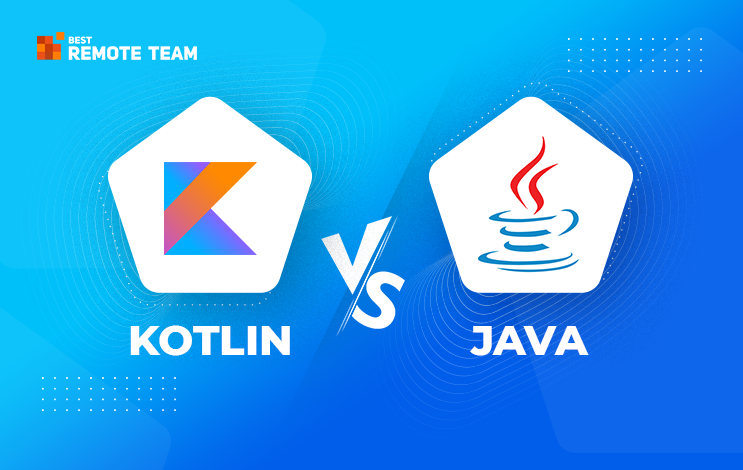Overview of Android development landscape
Java dominated the Android development landscape during its inception. When the Android launch happened, the creators announced Java as an integral part of the tech stack. Despite being acquired by Google, this aspect didn’t change. In fact, Google added Java to their Software Development Kit, making it an important aspect of development.
Sometime in 2011, JetBrains introduced Kotlin for Android app development. It is a statically typed open-source programming language comprising several features posing safety and security. Kotlin improved code readability and developer productivity.
As a result, more developers began opting for this programming language to deliver their solutions. Google started working on and released official documentation that could help developers get started with Kotlin language.
Despite the fact that Kotlin gained popularity while Java still existed, there are several reasons why they coexist.
- Developers were allowed to leverage their existing Java-based codebase to create new code with Kotlin. This interoperability opened new development opportunities.
- As a developer, you could choose to develop your web applications using both Java and Kotlin.
- Owing to regular updates and continuous support, Java and Kotlin are able to coexist.
Kotlin-An Overview
Kotlin was introduced as an open-source and statically typed programming language that could help build Android applications. It was created by JetBrains, which has also built the IntelliJ IDEA that is used for Android app development.
The main reason Kotlin was developed was to overcome the challenges developers face with commonly used programming languages such as Java. It was also developed to offer more modern features and reliable development methods to the user.
The main reason why it attracted the developer’s attention was the fact that Kotlin was compatible with Java. It also works with the inherent libraries. As a result, the developers could envision their legacy systems with Kotlin, without leaving their existing codebases.
Key Features
- You can use your boilerplate code efficiently as Kotlin uses precise coding for development. As a result, your code is clean and readable.
- Null pointer exceptions led to the crashing of Java code. However, with Kotlin’s null safety features, developers could easily avoid them.
- You don’t need to pronounce the type declarations as the compilers can interpret the variable type.
- You can easily add new functions to your codebase without changing the source code.
- With smart casts, you can write less code and explain more. As a result, your code is cleaner and error-free.
- With Coroutines, Kotlin managed to simplify concurrent and asynchronous programming.
Pros and Cons
| Pros | Cons |
| Code is concise and easier to maintain. | The learning curve is higher for Kotlin. |
| Null safety features ensure fewer runtime crashes. | The compilation time may be higher than Java for Kotlin. |
| Allows developers to add new functions to the code without changing the source code. | You have fewer resources and tutorials available for advanced concepts. |
| Has support from major IDEs thus allowing developers to create Android applications. |

Java-An Overview
Java was the official language for Android development when the latter was introduced. Java programming language used the Dalvik Virtual Machine to run the bytecode for Android applications.
As Android is a mature and open-source programming language, there is a huge community and ecosystem backing it. You can seek help from developers in the community to add a feature or enhance the functionality.
Moreover, Java is compatible with third-party libraries. There are several Java-based libraries and tools that you can use to enhance the development speed and offer greater attributes.
Key Features
- Java is a platform-independent programming language. You can write code once and run it across platforms. You must check if the platform is compatible with the Java Virtual Machine to translate the bytecode efficiently.
- There are several tools, libraries, and frameworks that support Java development. As a result, you have the backing of an excellent ecosystem.
- As it is a statically typed language, the variable types are explicit. You can easily debug the code early and remove the errors.
- It is a mature and evolved language supported by a strong and robust community. As a result, it offers the stability to build reliable applications.
- Java automates memory management via garbage collection, which ensures minimal memory leaks.
- Java compiles with the virtual machine that is common for all the platforms, thus enhancing speed.
Pros and Cons
| Pros | Cons |
| You can use the codebase across platforms compatible with Java Virtual Machine. | It is very verbose and expressive; hence, you will notice an increase in code length. |
| Strong backing of tools, libraries, and frameworks to expedite development. | Legacy codebases are built using outdated frameworks that can pose migration challenges. |
| In-built multithreading and concurrency for efficient multi-tasking. | Requires more boilerplate code than other programming languages. |
| Strong community support and a stable platform. |
Kotlin Vs Java: The Face-off
We have seen both programming languages individually and understood how they work. Let’s compare them and check how they help developers with Android app development.
#1 Performance and Efficiency
The first factor that you must consider when comparing programming languages is the performance of the language. There are several aspects to the performance.
Kotlin
- The runtime performance of the application is crucial in determining the performance of the application. In the case of Kotlin, the compilation speed is lower than Java. Moreover, owing to additional features, you may experience a slower movement.
- When it comes to performance, you must consider how efficient the language is in managing memory leaks. Java and Kotlin are interoperable, and Kotlin benefits from the garbage collection feature. As a result, it can handle the memory leaks efficiently. Moreover, the null safety feature ensures better memory management.
- As Kotlin uses less boilerplate code and works with concise code, the app developer can build the solution faster. Moreover, owing to its ability to handle concurrency, it improves task productivity.
Java
- As Java is mature and has been there for a long while, the language is optimized for compilation speed. It has prospered over the years in runtime efficiency.
- Java’s garbage collection feature combined with strong typing abilities offers better memory management.
- Java has a large ecosystem full of frameworks and tools, which offers great support for development. As a result, developers can create apps with greater speed and launch them easily.
The Better One
While the two frameworks are at par with respect to runtime performance and memory management, Kotlin offers better and more modern features. As a result, it helps improve the developer’s productivity and speed of development.
#2 Safety and Nullability
Nullability is an important aspect to consider when coding an application. We will be talking about nullability and safety parameters offered by both programming languages.
Kotlin
- Kotlin offers in-built null safety features. As a result, Kotlin variables cannot hold null values. They use specific modifiers, which makes the null value explicit to the developer.
- Handling runtime errors is an important part of safe and reliable programming. Kotlin encourages a proactive approach toward determining the runtime errors. Non-nullable types added to this approach will ensure minimal bugs.
- As the code is explicit and comes with a null safety feature, you will find it easier to read and maintain.
Java
- Developers have to manually check for null values as there is no built-in null safety feature in Java. This leads to more verbose code that is prone to errors.
- “If” statements are used to check for null values and variables. Few tools were created to identify the null values. However, Java doesn’t have any built-in features or variables.
- Java notices more clutter in code as it has to define null checks. As a result, the code is not easy to maintain or read.
The Better One
Kotlin has a definite advantage over Java owing to the built-in null safety feature. It makes Kotlin readable, error-free, and maintainable codebase.
#3 Interoperability
Interoperability is the reason for the coexistence of Java and Kotlin in Android development. We will look at all the factors impacting interoperability to define this context better.
Kotlin
- Kotlin was created to be interoperable with Java. As a result, either codebase can call the other with minimal issues. There are several tools that make this interoperability a success.
- The second most important part of this aspect is the migration. When it comes to migrating your Java code to Kotlin, you must move gradually. Start with classes and take one step at a time.
Java
- Java can easily interact and integrate the Kotlin code without hassles. As a result, you can use both languages in the same project without any issues.
- Migrating from Kotlin to Java is an incremental process. You may need to refactor the extension or specific functions available with Kotlin.
The Better One
When it comes to compatibility, developers win this round. Both programming languages are exceptionally compatible. Whether you are migrating from Kotlin to Java or vice versa, make sure to go incremental in the process. Overall, interoperability is a huge success for application development.
#4 Community and Ecosystem
The availability of libraries and strong community backing are important for confident development. It can also enhance a developer’s potential and productivity.
Kotlin
- Kotlin leverages Android tools, IDEs, and frameworks to build robust applications. Moreover, it also has its own ecosystem of tools and frameworks that enable good development.
- Kotlin has a growing and active community support. As it is endorsed by Google, you will notice an effort made by developers to build the community.
Java
- Java being a mature and robust platform has a solid and supportive ecosystem. There are several Java libraries and third-party tools compatible with Java that enable development.
- The Java community is strong and highly mature. You will find their presence across forums and websites. This is a good fit for developers.
The Better One
Both programming languages enjoy a solid ecosystem and are interoperable. Hence it makes development fast and easy. While both enjoy good community backing, Kotlin is still growing the community base.
#5 Developer Experience
When it comes to choosing the programming language, the developer’s experience plays a pivotal role.
Kotlin
Kotlin is an expressive and concise language. It is easier for those who have an understanding of Java. For beginners, it might pose a slight learning curve.
There are in-built features that may take a while to understand. The documentation is not yet mature, which can also be a problem when learning Kotlin.
Kotlin is still growing and there are limited resources supporting developer’s understanding. As a result, you may not find a lot of Kotlin developers.
Java
It is one of the best-documented programming languages. There are several tutorials and documents for all features of Java. As a result, it is easier to understand and adapt.
Java is a mature language, and it is easier to access the resources for Java.
The Better One
When it comes to learning the language or accessing the talent pool, Java is considerably better. You can easily find developers to support your vision.
Apps Built Using Kotlin and Java
Let’s look at three apps each for both programming languages.
Kotlin
- Slack: Slack used Kotlin owing to its interoperability with Java and modern features that enabled smooth development and better maintenance.
- Trello: The transition to Kotlin occurred because the language offers null safety features to reduce memory leaks. Moreover, it offers concise programming that enables maintainable code.
- AirBnb: The business needed to improve the app’s reliability. That’s why they shifted to the programming language with better modern features.
Java
- Facebook: As Java is a scalable and reliable programming language, Facebook chose to move ahead with it.
- Amazon: Being an eCommerce business with several features, they leveraged the extensive abilities of Java to build the solution.
- Twitter: The Android app was built using Java programming language. The platform chose the language owing to its stability and reliability.
Future Trends
Here we will look at all the future trends of the Android app development landscape.
- While Java will stay relevant even in the future, Kotlin will get a major pass as one of the dominant programming languages. It will continue to evolve, and owing to strong support, will become a preferred language.
- Owing to frameworks like Flutter and React Native, there will be substantial growth in cross-platform app development.
- As Kotlin continues to introduce modern features and aspects, this will be an integral part of the programming language. You will notice further integration with modern language features.
- In the near future, both Java and Kotlin will get in-built ML and AI tools. This will enable them to code the algorithms better.
Summary: Which language is better for Android apps?
Kotlin and Java are both excellent programming languages in their own ways. Kotlin offers more built-in features and modern syntax abilities that make it faster and safer. Moreover, it can handle null safety features better.
However, when it comes to performance and stability, Java is considered better by developers. Moreover, Java has a strong and supportive ecosystem. Kotlin’s ecosystem and documentation are in the evolving stage, which makes learning the language slightly difficult.
Depending on the complexities, the developer’s experience, and the type of features you need, you must choose the programming language.
Conclusion
The programming language is an integral part of your tech stack. Including the right language can save you a lot of time and effort. Moreover, it will help you build a more reliable and effective solution for the business.
Kotlin and Java are both reliable for Android app development. However, most developers leverage their interoperability to use both platforms. This allows them to create the best solutions that engaging and usable.
Best Remote Team can help you hire Java developers proficient with Kotlin and Java. We can help you achieve your objectives reliably and with great security. Connect with us with your requirements.







